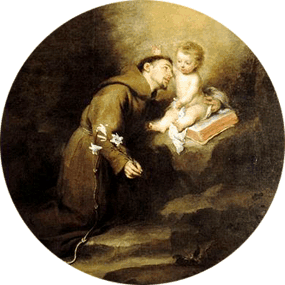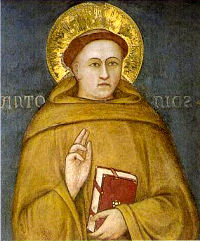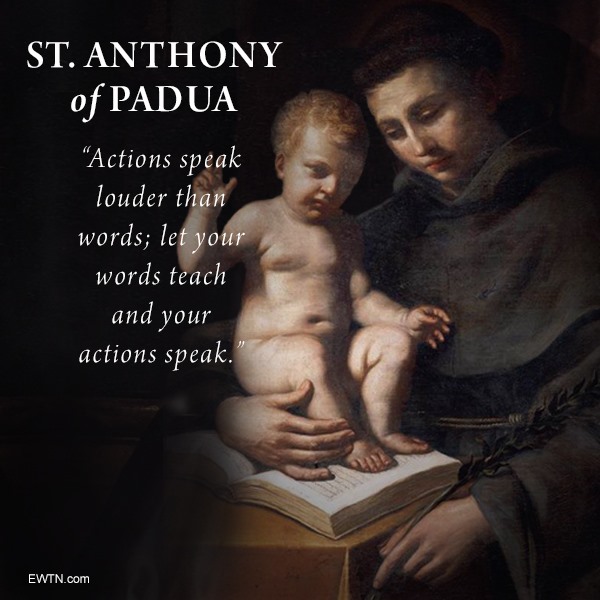
13 June
Memorial
St. Anthony of Padua (1195-1231)
Priest & Doctor of The Church
Born: 1195, Lisbon, Portugal
Died: 13 June 1231, Padua
Canonized: 30 May 1232, Spoleto, Italy by Pope Gregory IX
Major Shrine: Basilica of Saint Anthony of Padua in Padua, Italy
Patron of: animals; barrenness; Brazil; elderly people; faith in the Blessed Sacrament; fishermen; Franciscan Custody of the Holy Land; harvests; horses; Lisbon; lost articles; lower animals; mail; mariners; American Indians; oppressed people; Padua, Italy; poor people; Portugal; pregnant women; sailors; seekers of lost articles; shipwrecks; starvation; sterility; swineherds; Tigua Indians; travel hostesses; travellers; watermen
St. Anthony was born at Lisbon, Portugal. He bacame a canon regular and then a Franciscan preaching the Gospel everywhere in Portugal and Italy. Both as a theologian and as a popular preacher he fought vigorously against heresy. His preaching was inspired by the love of God and of souls and had an extraordinary power of conviction; it was filled with the penetrating power of the Bible. Pope Gregory IX, who heard him preach, called him during his lifetime the Arca Testamenti, meaning “the living repository of the Holy Scriptures” and Pope Pius XII, when he proclaimed him a Doctor of the Church, declared that he based all that he said on the texts of the Gospels, and could justly be called the Evangelical Doctor. St. Anthony lived for a time in France, but chiefly in Italy, and died at Padua in 1231 at age 36, with the reputation of great sanctity. From the day of his death innumerable miracles caused the faithful to invoke him as a wonderworker of untiring benevolence.
COLLECT PRAYER
Almighty ever-living God,who gave Saint Anthony of Padua to your people as an outstanding preacher and an intercessor in their need, grant that, with his assistance, as we follow the teachings of the Christian life, we may know your help in every trial. Through our Lord Jesus Christ, your Son, who lives and reigns with you in the unity of the Holy Spirit, God, for ever and ever.
Things to Do:
- St. Anthony was a great lover of the poor. Deprive yourself of some treat and put the money saved in the poor box.
- St. Anthony’s Bread refers to an episode told in the Rigaldina, the oldest life of St. Anthony. A Paduan mother, who lived near the Basilica during its construction, had left little Thomas, her 20 month old son, alone in the kitchen. The little boy, while playing, ended up head first in a tub of water. His mother found him lifeless. She screamed desperately but she didn’t give up. She called on the Saint. She made a vow: if she obtained the blessing of her child back to life, she would donate to the poor bread equal to the weight of her son to the poor. Her prayer was answered. Read more about St. Anthony’s Bread and consider donating to St. Anthony’s charities.
- St. Anthony is invoked by women in search of good husbands, so if you’re single and in search of a spouse, today is a good day to make a visit to a church or shrine dedicated to St. Anthony to make your petition to this generous saint!
- Because St. Anthony was buried on a Tuesday and many miracles accompanied his funeral, Tuesdays are special days of honoring him throughout the year. It is customary to pray a Novena to him on thirteen consecutive Tuesdays.
- For more information and more prayers see the following websites:
Popular Devotions in Honour of St. Anthony
St. Anthony Shrine
The Franciscans and The Companions of St. Anthony.
St. Anthony
Anthony is one of the most popular saints in the Church. He is the patron of lost things and numerous other causes. In Brazil, he is considered a general of the army; he is the patron of the poor and has been recognized as a wonderworker from the moment of his death.
He was born in Portugal and entered the Augustinian monastery of Sao Vicente in Lisbon when he was fifteen. When news of the Franciscan martyrs in Morocco reached him, he joined the Franciscans at Coimbra. At his own request, he was sent as a missionary to Morocco, but he became ill, and on his return journey his boat was driven off course and he landed in Sicily. He took part in St. Francis’ famous Chapter of Mats in 1221 and was assigned to the Franciscan province of Romagna.

He became a preacher by accident. When a scheduled preacher did not show up for an ordination ceremony at Forli, the Franciscan superior told Anthony to go into the pulpit. His eloquence stirred everyone, and he was assigned to preach throughout northern Italy. Because of his success in converting heretics, he was called the “Hammer of Heretics” and because of his learning, St. Francis himself appointed him a teacher of theology. St. Anthony of Padua was such a forceful preacher that shops closed when he came to town, and people stayed all night in church to be present for his sermons. He became associated with Padua because he made this city his residence and the center of his great preaching mission.
After a series of Lenten sermons in 1231, Anthony’s strength gave out and he went into seclusion at Camposanpiero but soon had to be carried back to Padua. He did not reach the city but was taken to the Poor Clare convent at Arcella, where he died. He was thirty-six years old, and the whole city of Padua turned out in mourning for his passing.
He was canonized within a year of his death and was declared a Doctor of the Church by Pope Pius XII in 1946.
—Excerpted from The One Year Book of Saints by Rev. Clifford Stevens
Source: Catholic Culture
From Butler’s Lives of the Saints
IN 1221 St. Francis held a general chapter at Assisi; when the others dispersed, there lingered behind, unknown and neglected, a poor Portuguese friar, resolved to ask for and to refuse nothing. Nine months later, Fra Antonio rose under obedience to preach to the religious assembled at Forli, when, as the discourse proceeded, “the Hammer of Heretics,” “the Ark of the Testament,” “the eldest son of St. Francis,” stood revealed in all his sanctity, learning, and eloquence before his rapt and astonished brethren. Devoted from earliest youth to prayer and study among the Canons Regular, Ferdinand de Bulloens, as his name was in the world, had been stirred, by the spirit and example of the first five Franciscan martyrs, to put on their habit and preach the Faith to the Moors in Africa. Denied a martyr’s palm, and enfeebled by sickness, at the age of twenty-seven he was taking silent but merciless revenge upon himself in the humblest offices of his community. From this obscurity he was now called forth, and for nine years France, Italy, and Sicily heard his voice, saw his miracles, and men’s hearts turned to God.
One night, when St. Antony was staying with a friend in the city of Padua, his host saw brilliant rays streaming under the door of the Saint’s room, and on looking through the keyhole he beheld a little Child of marvellous beauty standing upon a book which lay open upon the table, and clinging with both arms round Antony’s neck. With an ineffable sweetness he watched the tender caresses of the Saint and his wondrous Visitor. At last the Child vanished, and Fra Antonio, opening the door, charged his friend, by the love of Him Whom he had seen, to “tell the vision to no man” as long as he was alive. Suddenly, in 1231, our Saint’s brief apostolate was closed, and the voices of children were heard crying along the streets of Padua, “Our father, St. Antony, is dead.” The following year, the church-bells of Lisbon rang without ringers, while at Rome one of its sons was inscribed among the Saints of God.
Saint Anthony of Padua (another account)
A famous Franciscan saint especially honored at an impressive shrine in Padua, in northern Italy. But he was not born as Anthony, was an Augustinian priest first, and was from Lisbon, Portugal, not Italy. St. Anthony, along with Saint Bonaventure, another early Franciscan, lent theological heft to the somewhat esoteric movement founded by Saint Francis of Assisi. Saint Francis was uniquely sensitive and eccentric, unsuited to leadership and vexed by the need to exercise authority. It was Saints Antony and Bonaventure who gave the Franciscan Order credibility, who anchored it in sound theology, and who assured its continued growth.
Today’s saint was baptized Fernando and grew up in a privileged environment in Lisbon. He received a superior education and entered the Augustinian Order as an adolescent. While living in the city of Coimbra he met some Franciscan brothers who had established a poor hermitage outside of the city named in honor of St. Anthony of the Desert. Young Fr. Fernando was very attracted to their simple way of life. From these friars he also heard about the martyrdom of five Franciscan brothers at the hands of Muslims in North Africa. These martyrs’ bodies were ransomed and returned for burial in Fr. Fernando’s own abbey in Coimbra. Their deaths and burials were a life changing moment. The Augustinian Fr. Fernando asked, and received, permission to join the Franciscans and then adopted a new name – Anthony – taken from the patron saint of the hermitage where he had first come to know the Franciscans.
The newly christened Fr. Anthony then set out to emulate his martyr heros. He sailed for North Africa to die for the faith or to ransom himself for Muslim captives. But it was not to be. He became gravely ill and, on the return voyage his ship was providentially blown off course to Sicily. From there he made his way to central Italy, where his education, mastery of Scripture, compelling preaching skills, and holiness brought him deserving renown. The great Saint Francis himself soon came to know Saint Anthony. Saint Francis had been skeptical of learning in general, even prohibiting his followers who were illiterate from learning how to read. He feared they would become too prideful and abandon the radical simplicity and poverty he wanted all Franciscans to embrace. Saint Francis only reluctantly, several years after founding his Order, allowed some of his brothers to be ordained priests. He had originally relied exclusively on diocesan priests to minister to his brothers and distrusted any of his followers who aspired to the honor of the Priesthood.
In time, Saint Anthony became a famous preacher and teacher to Franciscan communities in northern Italy and southern France. His knowledge of Scripture was so formidable that Pope Gregory IX titled him the “Ark of the Testament.” In his Shrine in Padua a reliquary even holds his tongue and larynx for veneration. These organs had not disintegrated even long after the rest of his body had returned to dust. Saint Anthony is most often shown either with the child Jesus in his arms, holding a book, with a lily, or with all three. His intercession is invoked throughout the world for the recovery of lost items and for assistance in finding a spouse.
Saint Anthony died at the age of just thirty five in 1231, about five years after Saint Francis had died. He was canonized less than one year later. In 1946 he was declared a Doctor of the Church due to the richness of his sermons and writings. He was conscious as death came to take him. In his last moments, the brothers surrounding his bed asked him if he saw anything. He said, simply, “I see the Lord.”
St. Anthony of Padua, we seek your powerful intercession to have the right words on our lips to inspire the faithful and to correct and guide the ignorant. Through your example may our words also be buttressed by our powerful witness to Christ.
Source: My Catholic Life

For another account, lookup EWTN

